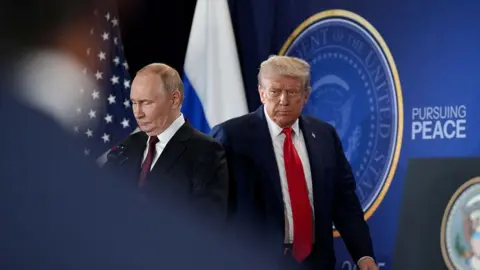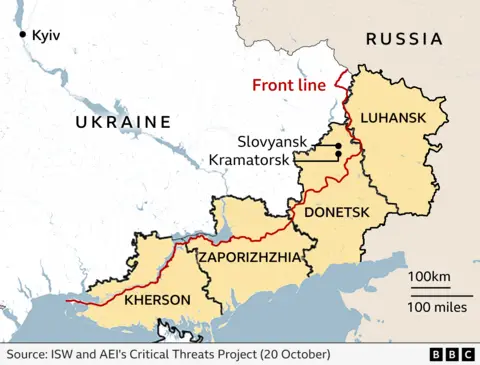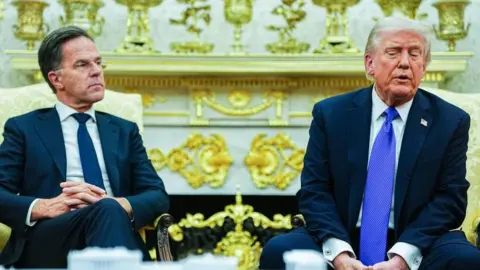Bernd Debusmann Jr,at the White House,
Max Matza and
Ian Aikman
The US has announced new sanctions targeting Russia’s two largest oil companies in an effort to pressure Moscow to negotiate a peace deal in Ukraine.
The announcement came one day after US President Donald Trump said a planned meeting with his Russian counterpart Vladimir Putin in Budapest would be shelved indefinitely.
“Every time I speak to Vladimir, I have good conversations and then they don’t go anywhere,” Trump said.
While the economic impact to Russia is likely to be minimal, it represents a major shift in Trump’s foreign policy, having previously said he would not impose sanctions until European nations ceased buying Russian oil. The Kremlin said Russia was “immune” to the sanctions.
Trump had repeatedly threatened tougher measures against Moscow, but has avoided them until now in hopes of brokering a peace deal in the three-and-a-half year long invasion.
His administration has sought to cast the US as a somewhat neutral mediator between the two warring nations, after years of full-throated support for Ukraine from his predecessor, Joe Biden.
But the US president has grown increasingly exasperated with the Kremlin over its failure to move forward with negotiations.
The sanctions are also something Ukraine’s leader, Volodymyr Zelensky, has been urging for months. He said they were a “good signal” from the US, adding that a ceasefire was possible if other nations applied more pressure on Russia.
On Wednesday, Trump criticised Putin for not being serious about making peace and said that he hoped that the sanctions would force a breakthrough.
“I just felt it was time. We waited a long time,” he said.
He called the sanctions package “tremendous”, adding that he hoped they could be swiftly withdrawn if Russia agreed to stop the war.
US Treasury Secretary Scott Bessent said the sanctions were needed due to “Putin’s refusal to end this senseless war”.
He said the affected oil companies – Rosneft and Lukoil – funded the Kremlin’s “war machine”.
 Getty Images
Getty ImagesOil and gas are Russia’s biggest exports. The two Russian oil firms export 3.1 million barrels of oil per day. Rosneft is responsible for nearly half of all Russian oil production, which makes up 6% of the global output, according to UK government estimates.
Moscow’s biggest customers include China, India and Turkey. Trump has also urged these countries to halt purchases of Russian oil in a bid to put economic pressure on the Kremlin.
India is poised to sharply reduce Russian oil imports in light of Trump’s announcement, news agency Reuters reports, citing unnamed industry sources. China has said it opposes the US sanctions.
Ukraine has in recent months targeted Russian oil refineries and energy infrastructure in an attempt to hurt its economy.
Zelensky had visited the White House on Friday, seeking to acquire long-range Tomahawk missiles that could strike deep into Russian territory, but came away empty-handed.
The day before, Trump had announced the proposal to meet Putin in Hungary after an unscheduled call from the Russian leader.
But following a call between US Secretary of State Marco Rubio and his Russian counterpart Sergei Lavrov, the idea was put on hold, with Trump saying he didn’t want a “wasted meeting”.
Trump later said he had refused to give Ukraine the missiles as they were “highly complex” and took a year of intense training to use. Zelensky appeared to suggest that, like with the sanctions, Trump may change his mind in the future.
Fighting on the ground continued overnight, with strikes on Ukraine’s capital, Kyiv, killing at least two people, officials said.
Earlier on Wednesday, Russia unleashed an intense bombardment that killed at least seven people, including children.

Last week, the UK slapped a similar sanctions package on Rosneft and Lukoil, with Chancellor Rachel Reeves stating that “there is no place for Russian oil on global markets”.
Russia’s embassy in London said targeting its country’s major energy companies would disrupt global fuel supplies and drive up costs worldwide. It added: “Pressure only complicates peaceful dialogue and leads to further escalation.”
Europe’s reliance on Russian oil and gas has fallen dramatically since the start of Moscow’s full-scale invasion of Ukraine, but Russian gas still accounts for 13% of EU imports – though the bloc has pledged to phase it out completely.
Trump had previously said he would only impose further sanctions on Moscow if Europe completely stopped buying Russian energy.
EU Commission President Ursula Von der Leyen praised a new sanctions package approved by the EU on Wednesday, which includes a ban on Russian liquefied natural gas imports by 2028.
She said this, along with the US sanctions, were “a clear signal from both sides of the Atlantic that we will keep up collective pressure on the aggressor”.
Earlier this year, the UK and US also sanctioned major Russian energy companies Gazprom Neft and Surgutneftegas.
 EPA
EPANato Secretary General Mark Rutte was at the White House when the sanctions were announced, and praised the move for “putting more pressure” on Putin.
He was expected to discuss a 12-point plan formulated by European allies and Kyiv that would see the current front lines frozen, a return of deported children as well as a prisoner exchange.
The plan also includes a war recovery fund for Ukraine, as well as security guarantees and a clear pathway for Ukraine to join the EU.
Trump has indicated that a key sticking point has been Moscow’s refusal to cease fighting along the current front line – something Zelensky is in favour of.
Russia has pushed back against that idea, with Kremlin spokesperson Dmitry Peskov indicating Russia had not changed its position of wanting Ukrainian troops to leave the parts of the eastern Donbas region Kyiv still controls.
Additional reporting by Pritti Mistry and Danielle Kaye

Follow the twists and turns of Trump’s second term with North America correspondent Anthony Zurcher’s weekly US Politics Unspun newsletter. Readers in the UK can sign up here. Those outside the UK can sign up here.




